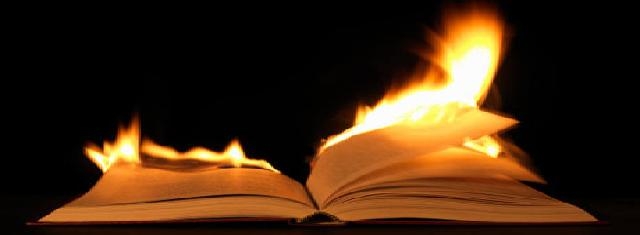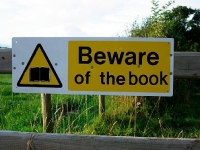Politics
Toxic Text Books or People?
Censorship and Speech Free Zone

Burning Knowledge (Source: Public Domain)
"ToxicTextbooks.com, where there used to be a published blacklist of "toxic" books one was not allowed to read and the "autistic" people who had authored them, along with a lot of dark hints about the terrible career-ending fate of anyone who defied their blacklist by citing a toxic paper. Naturally, the most vituperative language was directed towards the first item on the list, Axiomatic Theory of Economics. The link ToxicTextbooks.com no longer works, though Googling "toxic textbooks" still finds lots of material, so apparently all that has changed is that one must now contact Edward Fullbrook directly for permission to cite someone without the convenience of just checking one's bibliography off against his blacklist to assure compliance.
~http://www.axiomaticeconomics.com/toxic_textbooks.php
It would seem that history would be doomed to repeat itself without the knowledge written in books to assure the mistakes of old are never repeated today. However there are those still kindling the fires of destruction raged against the vast sea of knowledge today. When in the presence of that knowledge before it is carelessly burned, one can only ponder how much more the mistakes of history would repeat without the preservation of books. History, thoughts and ideas whether right or wrong are recorded for the future generation to see.
It would seem that history would be doomed to repeat itself without the knowledge written in books to assure the mistakes of old are never repeated today. However there are those still kindling the fires of destruction raged against the vast sea of knowledge today. When in the presence of that knowledge before it is carelessly burned, one can only ponder how much more the mistakes of history would repeat without the preservation of books. History, thoughts and ideas whether right or wrong are recorded for the future generation to see.
Axiomatic - Self evident?
"It is axiomatic that those who would burn rather than preserve history are egotistic self proclaiming scholars who seemingly base their intelligence upon their overbearing ignorance." ~Journalist Joseph Kirk - The Objective Review
Burning of books and burying of scholars, "burning of books and burying (alive) of scholars (implying Confucian scholars)" is a phrase that refers to historical accounts of a policy and a sequence of events in the Qin Dynasty of Ancient China, between the period of 213 and 210 BC. During these events, the Qin emperor slaughtered hundreds of scholars and burned innumerable copies of books.
"It is axiomatic that those who would burn rather than preserve history are egotistic self proclaiming scholars who seemingly base their intelligence upon their overbearing ignorance." ~Journalist Joseph Kirk - The Objective Review
Burning of books and burying of scholars, "burning of books and burying (alive) of scholars (implying Confucian scholars)" is a phrase that refers to historical accounts of a policy and a sequence of events in the Qin Dynasty of Ancient China, between the period of 213 and 210 BC. During these events, the Qin emperor slaughtered hundreds of scholars and burned innumerable copies of books.
"Books" at this point probably referred to writings on bamboo strips which were then bound together“”whether codices or other types of "books" were destroyed is probably unknown, due to their destruction). This contributed to the loss to history of many philosophical theories of proper government (known as "the Hundred Schools of Thought"). The official philosophy of government ("legalism") survived. The "Burning of books and burying of scholars" was part of what is known as "the Fires of Qin".
The Qin emperor died in 210 BC and national chaos ensued. However, despite the lack of a functioning central government to pursue this policy, what happened was further destruction of historical materials: the Qin capital city was sacked and burned in 207 BC, destroying official copies of works which had been retained in the imperial library and official archives, together with the Qin's own approved literary records. Together with the deaths of many scholars in these few years, the "burning of books and burying of scholars" resulted in an incalculable loss to the history of China, and to human knowledge in general.
Hitler wasn't the only one to attempt to persuade and redirect the future by erasing the past. “Make the lie big, make it simple, keep saying it, and eventually they will believe it.“
“It is always more difficult to fight against faith than against knowledge.“
“"The man who has no sense of history, is like a man who has no ears or eyes."
~Quotes by Adolf Hitler
He used history to plan and implement his agendas, and the true defense against historical mistakes and their chaotic effects is knowledge.
The only thing toxic about toxic text books is not the book but the one holding the match to light the fire.
This has been another objective review by The Objective Review.
“It is always more difficult to fight against faith than against knowledge.“
“"The man who has no sense of history, is like a man who has no ears or eyes."
~Quotes by Adolf Hitler
He used history to plan and implement his agendas, and the true defense against historical mistakes and their chaotic effects is knowledge.
The only thing toxic about toxic text books is not the book but the one holding the match to light the fire.
This has been another objective review by The Objective Review.
Hitler Censorship Freedom Education Knowledge Books Fire Burn Oppression Filter Adolf History Destruction Group Promotion Deception Communism National International News
Liability for this article lies with the author, who also holds the copyright. Editorial content from USPA may be quoted on other websites as long as the quote comprises no more than 5% of the entire text, is marked as such and the source is named (via hyperlink).






